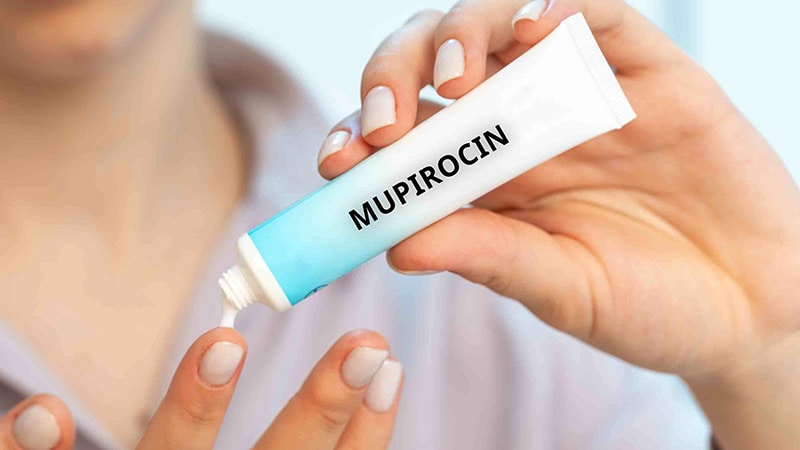TOPLINE:
Bacterial decolonization with mupirocin nasal ointment significantly lowered rates of severe acute radiation oral mucositis in patients with nasopharyngeal carcinoma undergoing radiotherapy. The intervention also reduced oral pain and dysphagia, and improved quality of life (QOL) without increasing radiation dermatitis.
METHODOLOGY:
- Acute radiation oral mucositis is a common, debilitating complication of radiotherapy in patients with nasopharyngeal carcinoma. Research showed that oral Staphylococcus aureus, a potential factor in oral mucositis, can increase after radiotherapy. Mupirocin, an inexpensive topical antibiotic, can help eliminate S aureus from nasal and oral sites but has not been tested in this setting.
- Researchers conducted a phase 3 trial of 176 patients with nasopharyngeal carcinoma (median age, 52 years) undergoing radiotherapy, who were randomly assigned to receive either a bacterial decolonization regimen with mupirocin nasal ointment (n = 88) or standard of care (n = 88).
- The decolonization regimen consisted of mupirocin nasal ointment applied twice daily for 5 days, starting 3 days before radiotherapy, followed by a 1-week break; this cycle was repeated throughout treatment. All patients received routine oral care with Kangfuxin Liquid mouth rinses and nasal saline irrigation.
- The primary endpoint was the occurrence of severe (grade ≥ 3) oral mucositis during radiotherapy. Secondary endpoints were QOL, pain, S aureus colonization in the oral and nasal cavities, and the incidence of grade ≥ 2 radiation dermatitis.
TAKEAWAY:
- Severe oral mucositis occurred in 22.7% of the mupirocin group vs 47.7% of the standard care group (relative risk, 0.48; P < .001). Kaplan-Meier analysis also showed a significantly lower cumulative incidence of severe oral mucositis among patients receiving mupirocin (22.8% vs 48.3%).
- Bacterial decolonization and the mean oral radiation dose were independent risk factors for severe acute radiation oral mucositis, with decolonization reducing the risk (odds ratio [OR], 0.27) and a higher radiation dose increasing the risk (OR, 3.93). Age (OR, 1.61; P = .16) and S aureus presence (OR, 1.59; P = .19) were not independent risk factors.
- At week 4, patients in the mupirocin group reported less oral pain (median score, 25.0 vs 50.0) and dysphagia (8.3 vs 33.3), with improvements sustained through treatment completion. The rates of grade ≥ 2 radiation dermatitis did not differ between the groups.
- By the end of treatment, S aureus colonization was significantly lower in the bacterial decolonization group at both nasal (9.4% vs 22.9%) and oral (5.9% vs 20.5%) sites.
IN PRACTICE:
“This phase 3 randomized clinical trial demonstrated that the mupirocin-based BD [bacterial decolonization] therapy effectively reduced AROM [acute radiation oral mucositis] severity and improves QOL in patients with NPC [nasopharyngeal carcinoma] undergoing radiotherapy,” the authors of the study wrote, adding that mupirocin is a “safe, simple, and cost-effective strategy to reduce AROM severity.”
SOURCE:
This study, led by Zhaohui Liao, BSN, Jiangxi Cancer Hospital, The Second Affiliated Hospital of Nanchang Medical College in Nanchang, China, was published online in JAMA Oncology.
LIMITATIONS:
Study limitations were single-center design and lack of placebo control. Oral mucositis assessment by a single evaluator could introduce subjectivity. The S aureus culture method might lack sensitivity, potentially underestimating colonization rates.
DISCLOSURES:
The trial received funding support from the Science and Technology Research Project of Education Department of Jiangxi Province, the Open Fund for Scientific Research of NHC Key Laboratory of Personalized Diagnosis and Treatment of Nasopharyngeal Carcinoma, National Natural Science Foundation of China, and “Five-level Progressive” talent cultivation project of Jiangxi Province Key R&D Program, and Jiangxi Cancer Hospital & Institute. The authors reported having no conflicts of interest.
This article was created using several editorial tools, including AI, as part of the process. Human editors reviewed this content before publication.
Source link : https://www.medscape.com/viewarticle/ointment-cuts-severe-radiation-mucositis-nasopharyngeal-2025a1000ls4?src=rss
Author :
Publish date : 2025-08-18 12:24:00
Copyright for syndicated content belongs to the linked Source.
